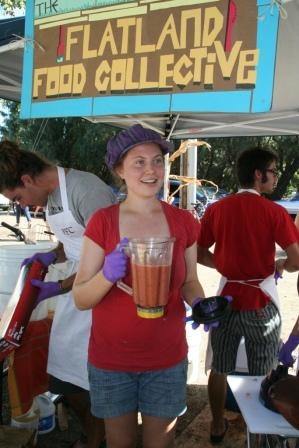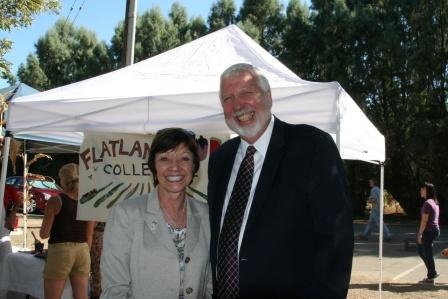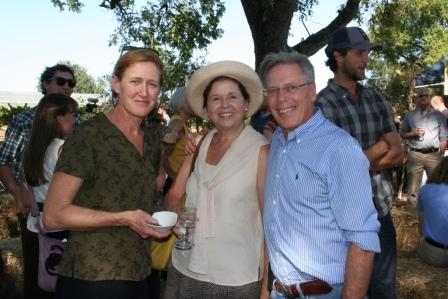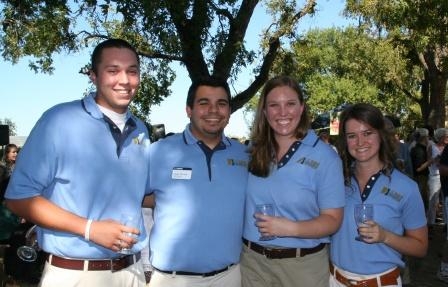Posts Tagged: Karen Ross
California agriculture is worth the water
As California struggles through the four-year drought, a common complaint asserts that agriculture generates only 2 percent of the gross domestic product, but consumes 80 percent of the state's water. Both figures are deceptive, says an op-ed in the Los Angeles Times written by a UC Agriculture and Natural Resources (UC ANR) agricultural economist, and the California secretary of agriculture.
The authors, Dan Sumner, director of the UC ANR Agricultural Issues Center, and Karen Ross, secretary of the California Department of Food and Agriculture, say the 80 percent figure doesn't account for water diverted for environmental purposes to rivers, lakes, streams, deltas, bays and, ultimately the ocean. The 2 percent figure doesn't account for ripple effects and multipliers placed in other categories, such as "transportation and warehousing" and "finance and insurance," which are connected to "every one of our 78,000 farms."
Besides, Sumner and Ross wrote, the state's unique capacity to produce healthful and desirable food is not found anywhere else in the United States.
"Food is central to California in more than just the nutritional sense," the authors said. "It contributes to nearly every aspect of our economy and our lives, an important point to keep in mind as we weigh what our water is worth during this drought, and the next one."
Napolitano presents UC initiative to state food and agriculture board
The UC Global Food Initiative is intended to marshal the university's resources – including curriculum and world-class research, student efforts and operational efforts in place across the university's 10 campuses – to address global challenges related to food.
“This initiative grows out of a commitment made by all 10 UC campus chancellors and myself,” Napolitano said. “It is a commitment to work collectively to put a greater emphasis on what UC can do as a public research university, in one of the most robust agricultural regions in the world, to take on one of the world's most pressing issues.”
The food initiative will build on UC's tradition of innovative agricultural research to support farmers and ranchers. Future efforts will build on work already begun by UC's 10 campuses and its Division of Agriculture and Natural Resources (ANR) to address internal and external issues with a variety of approaches.
UC research, for example, taught Californians how to remove salts from the alkali soils in the Central Valley, transforming that barren landscape into one of the world's most productive farming regions, Napolitano noted in her presentation to the California State Board of Food and Agriculture.
Today, the World Food Center at UC Davis stands with 26 other centers dedicated to food and agriculture on that campus; students and faculty at UC Santa Cruz are transforming the field of agroecology; and the Berkeley Food Institute is studying the relationship between pest control, conservation and food safety on Central Coast farms. The cutting-edge Healthy Campus Initiative at UCLA taps all members of the campus community.
The initiative is not limited to seeking any single solution or set of solutions to the myriad food issues confronting the world, Napolitano said.
“The idea,” she said, “is to provide the intellectual and technical firepower, as well as the operational examples needed for communities in California and around the world to find pathways to a sustainable food future.”
In describing the building blocks for the initiative, Napolitano noted that the university's agricultural outreach and public service programs – in every California county and more than 100 nations – bring UC resources to individuals and communities to help them access safe, affordable and nutritious food while sustaining scarce natural resources.
The university's work also will help inform and drive policy discussions from the local to the international levels, and expand partnerships with government agencies such as the California Department of Food and Agriculture.
“This initiative shows great vision and leadership from President Napolitano and the University of California,” said CDFA Secretary Karen Ross, “Climate change and population growth will greatly strain our ability to provide healthy food to people here and around the world.
“President Napolitano's proposal to leverage the strategic assets of the entire UC organization makes it a valuable partner in addressing the significant challenges and opportunities for our production agriculture and food system.”
Emphasizing that student engagement is key, Napolitano announced, as one of her first actions, the funding of three $2,500 President's Global Food Initiative Student Fellowships to be awarded on each campus to undergraduate or graduate students. The fellowships will fund student research projects or internships.
Among other early efforts to be undertaken as part of the initiative are the following:
- Internally, campuses will heighten their collective purchasing power and dining practices to encourage sustainable farming practices, and model healthy eating and zero food waste; food pantries and farmers markets that exist on some campuses will be spread to all 10. Partnerships with K-12 school districts to enhance leveraging procurement for these purposes also will be explored.
- Food issues will be integrated into more undergraduate and graduate courses, catalogues of food-related courses will be developed, and demonstration gardens will be made available on each campus to increase opportunities for students to participate in experiential learning.
- Data mining of existing information will be deployed to help develop insights and action plans for California agriculture and responses to climate change.
- New policies will be enacted to allow small growers to serve as suppliers for UC campuses.
Related links
California State Board of Food and Agriculture
UC Division of Agriculture and Natural Resources
CDFA honors UC Cooperative Extension centennial
The annual Ag Day at the Capitol event, held Wednesday (March 19) in Sacramento, honored the University of California Cooperative Extension for its centennial. California Department of Food and Agriculture Secretary Karen Ross presented a proclamation to Barbara Allen-Diaz, UC vice president for Agriculture and Natural Resources, who oversees UC Cooperative Extension.
“I want to commend my good friend Barbara Allen-Diaz and Cooperative Extension,” said Ross. “You help us take all that great knowledge from the UC System and extend it directly to farmers and ranchers. It is a circle of innovation that sets us apart. It is absolutely crucial to our future and I'm really happy to be here to celebrate 100 years with you.”
UC Cooperative Extension, which has offices in counties throughout California, will be holding local celebrations throughout 2014. For more information about the UCCE centennial, visit http://ucanr.edu/100.
UC Agriculture and Natural Resources moves to new location
“With our administrative and statewide program staff co-located in one building in Davis, we will be able to work more efficiently to meet the needs of Californians statewide,” said Allen-Diaz. “We also anticipate savings on energy and other costs by renovating an existing building to meet LEED Certified Interior standards.”
Originally built as an indoor roller hockey rink, and later used as the temporary home of the Yolo County Library and the Explorit Science Center, the building will become the administrative home for UC ANR’s statewide programs. Interior renovations to the existing 33,000 square feet include adding 9,600 square feet of a partial second floor in the rink portion of the building.
UC ANR’s statewide programs include Cooperative Extension advisors located in 57 counties as well as nine Research and Extension Centers in different ecosystems from Tulelake near the Oregon border to El Centro in the Imperial Valley. UC ANR also manages a number of well-known statewide programs whose administrative offices will be located in the new building, including:
- Integrated Pest Management;
- Master Gardeners;
- 4-H Youth Development; and
- The Expanded Food and Nutrition Education Program (EFNEP).
“Agriculture is the heart of Davis' past, and is integral to our future. Agriculture brought us UC Davis, our connection to the Earth and thus our environmentalism, and our intense dedication to healthy living. I am now very pleased to welcome the UC system’s Division of Agriculture and Natural Resources to our community. The City of Davis is honored to be part of UC ANR's worldwide missions for research, education, public service and economic development,” said Davis Mayor Joe Krovoza.
For more information about UC ANR, visit http://ucanr.edu.

From left, California Department of Food and Agriculture secretary Karen Ross, UC ANR VP Barbara Allen-Diaz and Davis Mayor Joe Krovoza cut the ribbon to new building.
Sustainable agriculture and food systems: An innovative new major at UC Davis
Two terms related to food production — “sustainability” and “food systems” — have been blended into a new major at the University of California, Davis. Sustainable Agriculture and Food Systems, the new undergraduate major, in some ways embodies a re-blossomed, student-driven interest in food production, akin to the organic farming movement of the 1970s.
Food systems is a broad term that addresses nutrition and health, sustainable agriculture, and community development. A food system encompasses the entire production chain, not only from farm to fork, but includes broader topics such as short- and long-term impacts on the environment, labor, management of food inputs (e.g., water, pesticides) and outputs (e.g., waste), and the socioeconomic impacts on communities engaged in the food system. In other words, food systems encompasses agricultural production within the broad context of environmental, economic, social, and political concerns.
Neal Van Alfen, dean of the College of Agricultural and Environmental Sciences at UC Davis, noted during the celebration ceremony for the new major, “Agriculture is incredibly knowledge intensive. It is as knowledge intensive as launching rockets.” He cited a terrarium as a model for how we must maintain a sustainable food production system with limited resources to feed a rapidly growing global population. “The planet is a closed system,” Van Alfen said. “We have to get it right.”
Professor Tom Tomich, master adviser for the major and director of the UC Davis Agricultural Sustainability Institute, said, “The major is about leadership, as much as it is about education. It’s about creating a new generation of leaders who will go on to guide the sustainability transformation for this country and for this planet.” Unlike student programs that are limited to classroom learning, Tomich said that the curriculum for the new major combines the best of three worlds — classroom and labs, the Student Farm, and the real world.
Karen Ross, Secretary of the California Department of Food and Agriculture, attended the opening, along with other high-level state leaders in agriculture, including Craig McNamara, president of the California State Board of Food and Agriculture, and Don Bransford, president of the UC President’s Advisory Commission on Agriculture and Natural Resources.
UC Davis chancellor Linda Katehi, who spoke about UC Davis’s national leadership in sustainability, noted, “This leadership from the state shows the importance of the program and what impact it may have on the state, on us as an institution, and on our students.”
“Agriculture and food have shaped human civilization and are central to well-being and health,” said Ralph Hexter, provost of UC Davis. “We recognize the need to understand both the natural world and our human activities holistically.” Addressing the global significance of the major, Hexter added, “Sustainable Agriculture and Food Systems is a major that is truly designed for the 21st century. It responds to today’s needs and incorporates experiential learning and state-of-the-art research.”
A recent UC Davis graduate who helped lay the groundwork for the curriculum, Maggie Lickter, spoke passionately to the 200 people celebrating the major. She said that the major is driven largely by students who have cutting-edge ideas and want to be engaged in creating a useful education. Lickter said that many students felt that components were missing from the traditional agricultural curriculum, such as farming practices grounded in an understanding of ecological systems, and the application of critical thinking skills to modern-day food systems.
In a moving tribute to the success of establishing the major, Lickter said, “This work can’t stop. If you stop stoking romance, love dissolves. If you stop tending a garden, plants wither. So we must stay committed to the evolution of this major.”
Dean Van Alfen, a strong proponent of UC Davis partnerships with the California agriculture industry, views this major as an additional way to create graduates with industry-ready work skills. Addressing UC Davis’s national and global leadership in agriculture, he said, “Agricultural sustainability has been a theme of this campus for a very long time. This new interdisciplinary major is the future in so many ways. It reflects our campus spirit and our culture. It will meet the needs of our stakeholders and the future of our planet.”
For more information:
- UC Green Blog
- Early press release
- UC Davis Student Farm
- UC Davis Agricultural Sustainability Institute
- About the major










